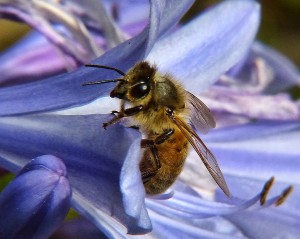Apis (Honeybee)
Apis is the Latin word for Honeybee
An acient treatment for joint pain, was a live bee sting. Today, Apis is a homeopathic remedy that contains bee venom and used to treat insect bites and conditions resembling stings.
Historical Origins:
Hippocrates, (in the fifth century B.C.) noted that diseases could be cured by “similars”: What causes a disease may also cure it, or “like cures like.” The German doctor Paracelsus, (in the 1500s) also followed this principle, prescribing tiny doses of poisons thought to cause disease. Closely related to homeopathy’s Law of Similars, this belief states that a substance which can cause symptoms of illness in the healthy can also be used to cure those symptoms in the sick. Thus, venom from a bee treats its “similar” beestings.
The Source of the medicine:
- The entire body of the honeybee is crushed or ground to prepare the remedy.
Used for:
- Those allergic to bee-stings or poison ivy.
- Insect bites, nettle rash, allergic conditions, blisters, whitlow (an abscess on the fingertip).
- Infections of the urinary tract, including cystitis, with stabbing hot pains. Urinary incontinence in elderly persons.
- Fluid retention causing swelling of the eyelids, conjunctivitis and sties.
- Allergic conditions that cause sore throat and swallowing difficulties, and tonsillitis (the throat can look as if it was stung and can be puffy, red and raw). The person often experiences hot, stabbing headaches and has dry skin.
- Swollen, painful inflammation of the joints as in arthritic conditions and for peritonitis and pleurisy. The symptoms are made worse by heat and touch, stuffy airless rooms following sleep and in the early evening. They improve in the fresh, cool open air, after taking a cold bath, or any cold application.
- Hives, weeping or pus-filled blisters and carbuncles.
Symptom Gauge:
Better:
- With cold compresses
- In cold weather
- With exercise
- In fresh air In the morning
Worse:
- With heat applications
- When warm
- When touched
- In hot, stale air
- In the afternoon
Other Diagnostic Choices:
For most bites and stings, as well as for skin inflammations which have stinglike symptoms, homeopaths will turn to Apis as their first choice. Some reactions to bites and stings, include a slightly different set of symptoms. In a case like this, a homeopath might choose to prescribe another type of remedy. The following are some of these alternate choices and their symptom profiles.
Ledum:
- Extensive swelling
- Sensation of cold in the affected area
- A stinging, pricking feeling
- Relief from cold applications
Hypericum:
- Bites or stings on fingers or toes
- Extensive inflammation
- Shooting pains
- Worsening of symptoms with cold applications
Lachesis:
- Affected area has a bluish appearance
- Relief from cold applications
Staphsagria:
- Excessive pain
- Indignation about suffering
- Frequent victim of insect bites, especially mosquito bites
Urtica urens:
- Burning and stinging that itch badly
- Hives at the site of the sting
References:
- The Complete Guide to Natural Healing
- Healthcare Natural
Apis is a great first-aid remedy to have on hand, particularly if you are allergic to bee-stings, or other insect bites. You should ALWAYS seek medical attention, but Apis offers immediate help in an emergency situation.
Note: Consult with a Physician or certified herbologist if you are seeking medical remedies. The information is not intended as medical advice. PagansWorld.org is not liable for the misuse of the herb listed above.
Thanks for stopping by! Well wishes to you all, have a great day!





